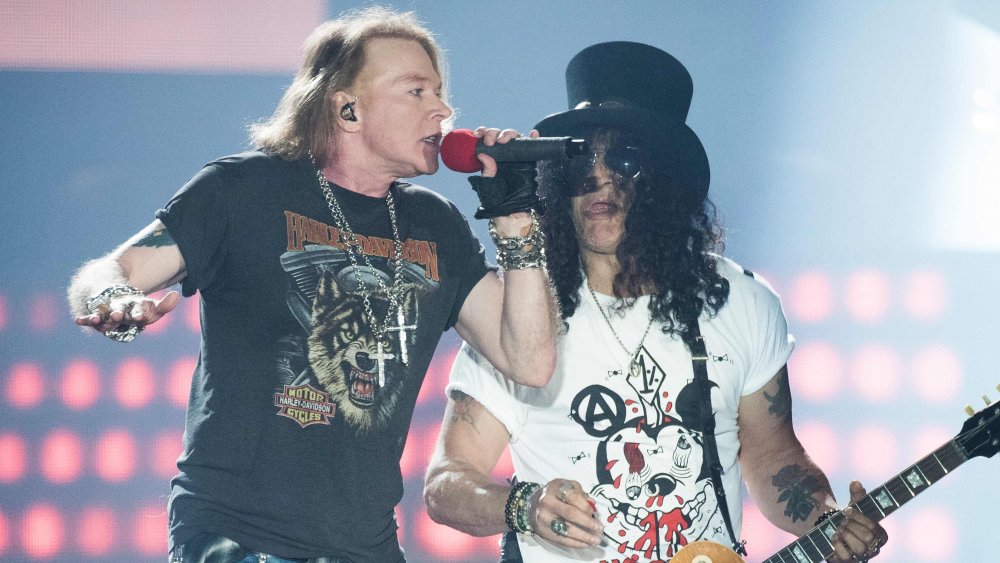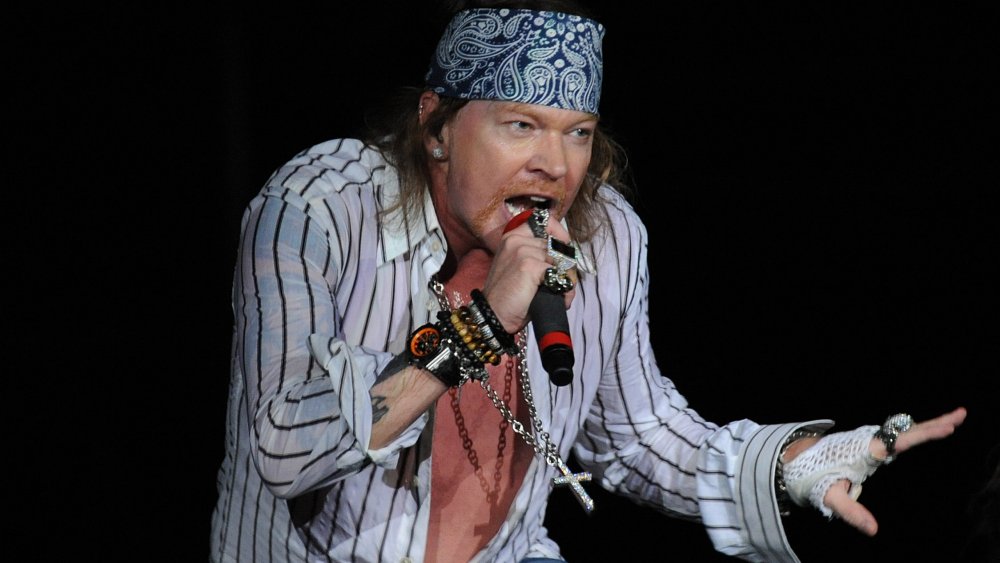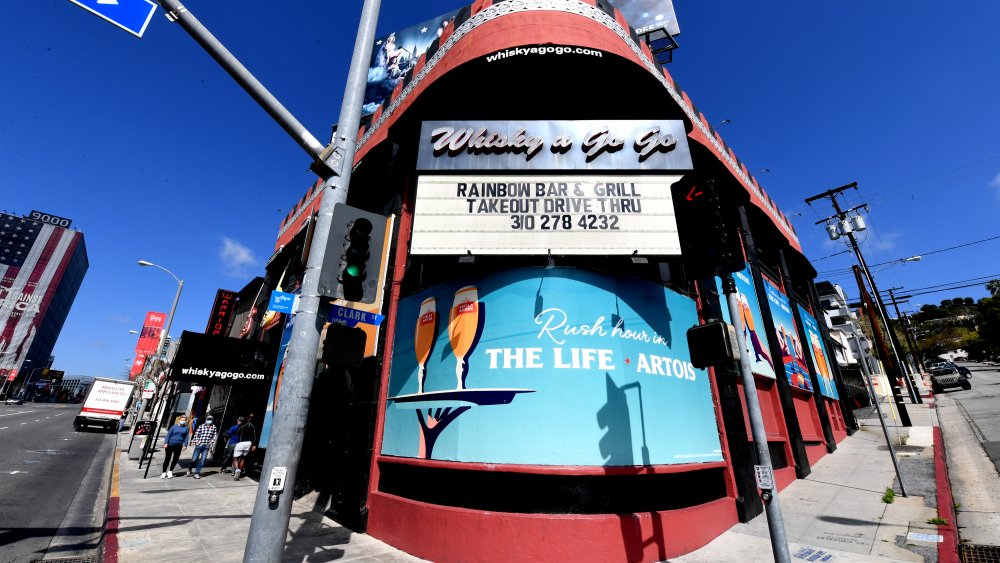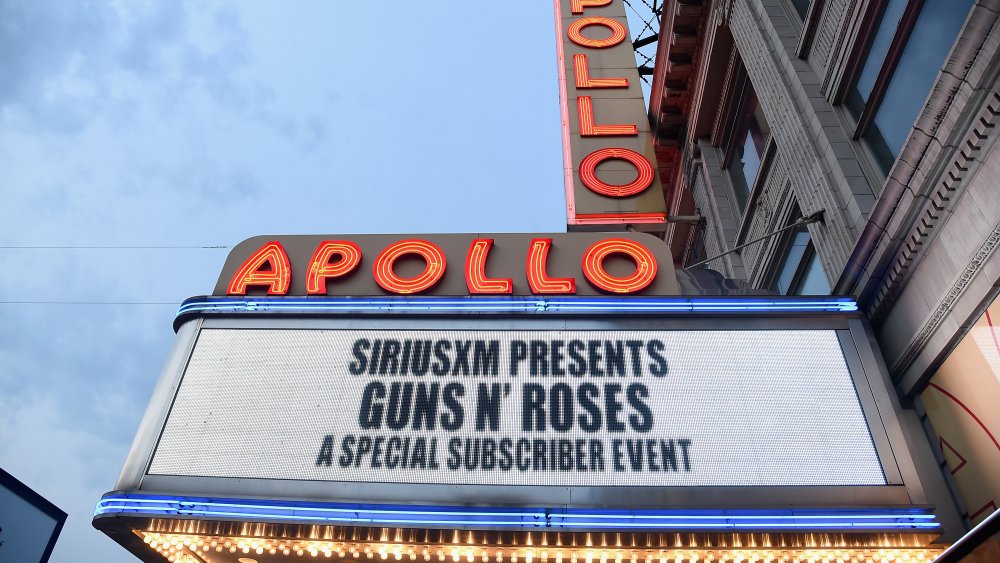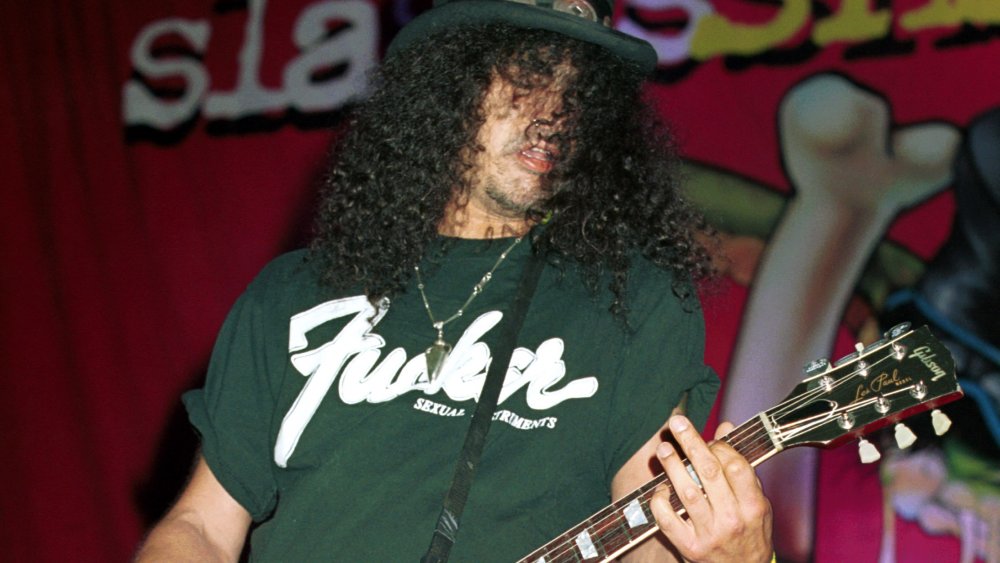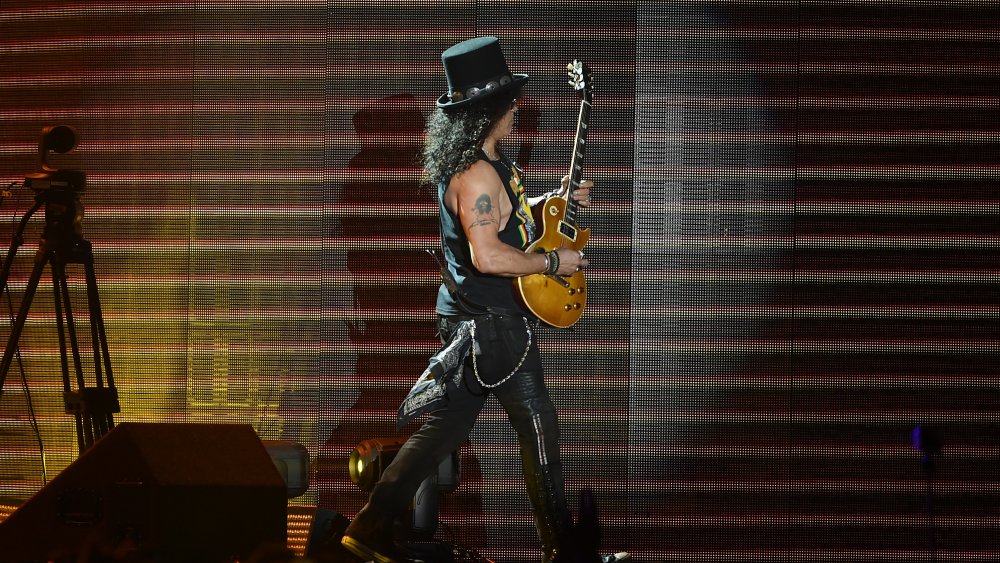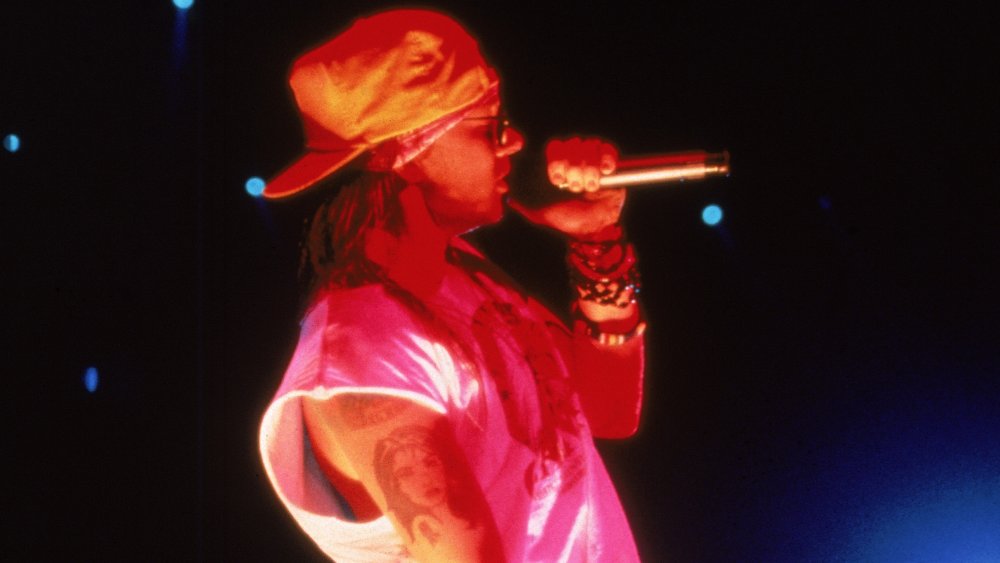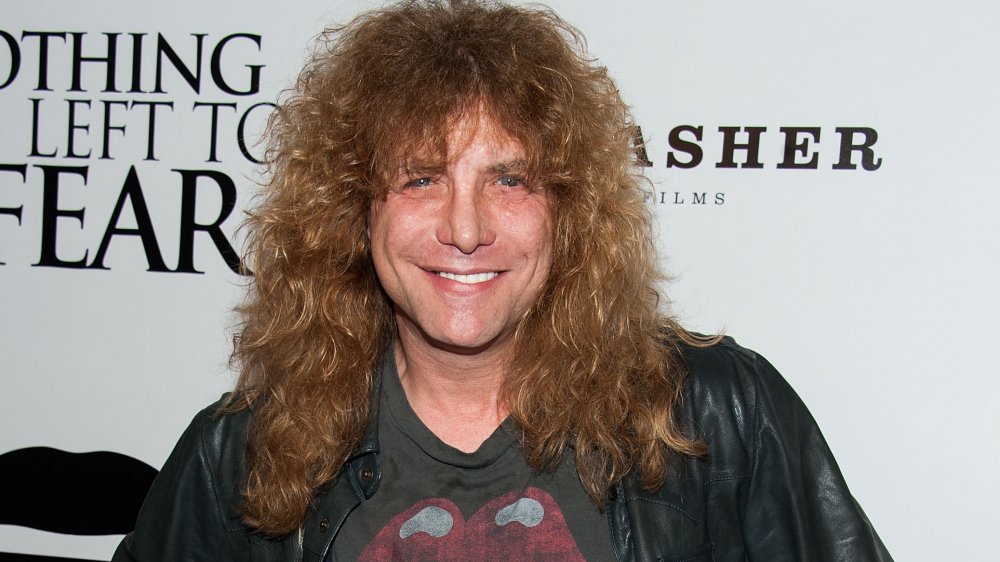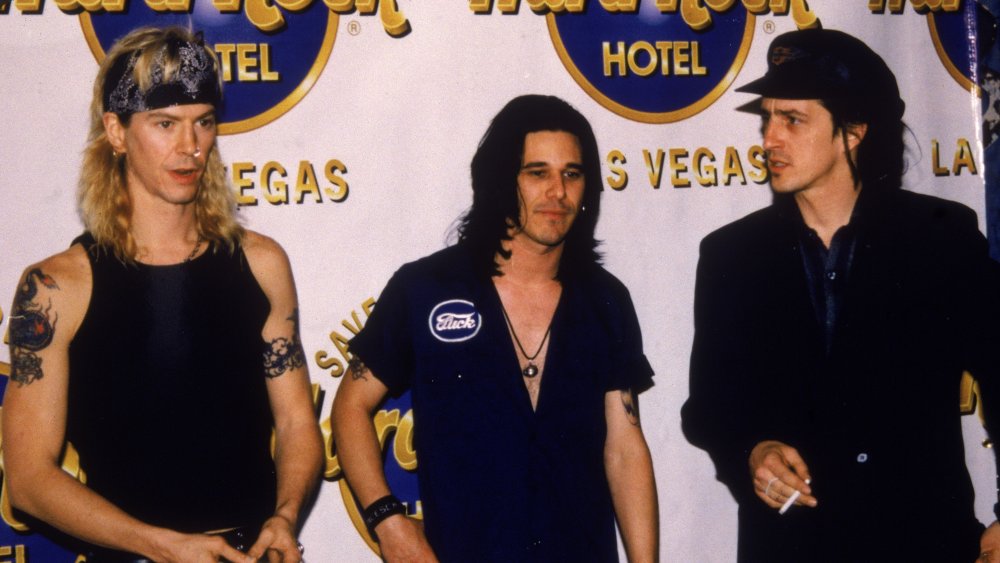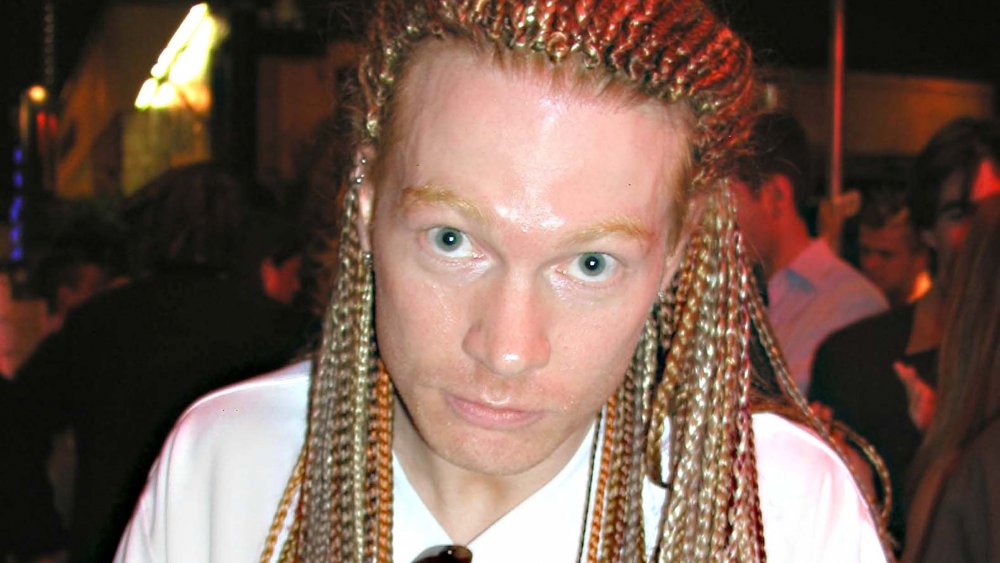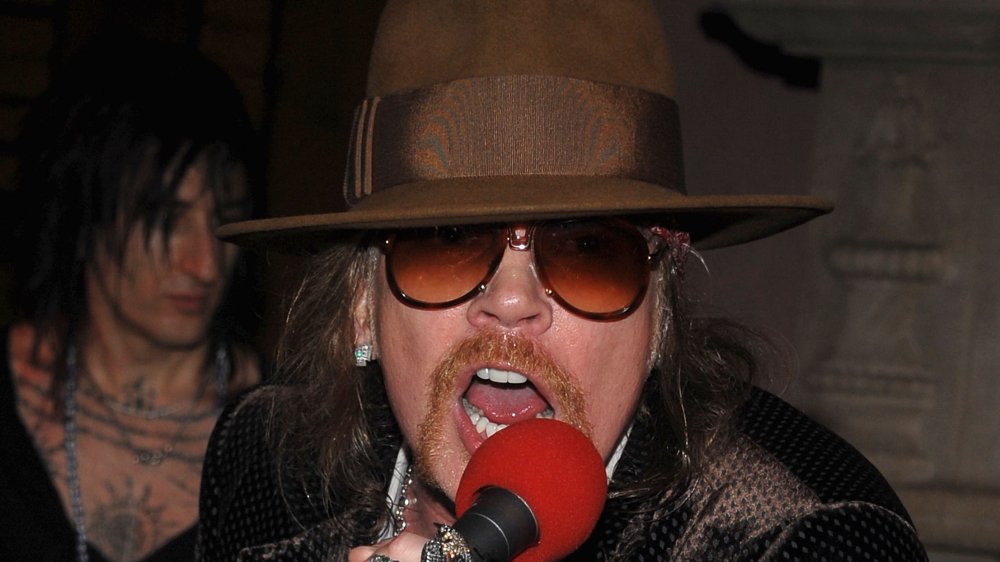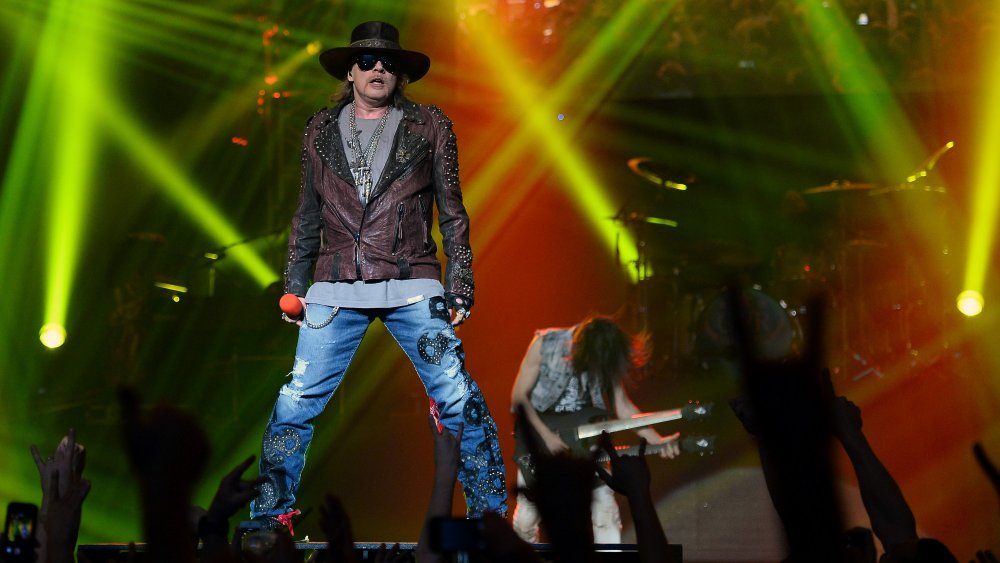The Tragic Real-Life Story Of Guns N' Roses
Throughout much of the 1980s, rock music was in rather dire straits. At the top of the charts, you'd find synth-pop hits and the glam metal balladry (emphasis on the glam) of Bon Jovi and Poison, groups who got paid like rock stars but had none of the street cred. Underground, you'd find raw, heavy music, played by the likes of Metallica and Slayer, who had the respect of the headbangers but none of the commercial appeal.
Then came Guns N' Roses and their titanic 1987 debut, Appetite for Destruction, an album full of blues-and-punk influenced hard rock that had all the chart-topping catchiness of their hair metal contemporaries but none of the corniness that deprived those groups of respect. The band was raw. Its members were unpredictable. They were dangerous. They were real. But they were only those things because they wrote and played from the heart, pulling lyrics from experiences rooted in addiction and pain, poverty and abuse. They lived it. They earned it. And when they made it, massive egos threatened to burn it to the ground. This is the tragic, real-life story of one of history's last great rock bands.
The members were troubled kids from broken homes
This one is perhaps as unsurprising as it is tragic, but each and every single one of the Appetite era band members came from a broken home. Drummer Steven Adler's father left the family when he was a kid. His resulting problematic behavior forced his mother to send him to his grandparents in Hollywood, where he met Saul Hudson. Hudson, popularly known as Slash, was also the child of divorced parents. They'd split in 1974 after years of trying to hold a marriage together while in separate countries. Like Adler, Slash neglected school and indulged in substance abuse.
Also like Slash, Adler fell in love with rock music. Naturally, the two decided to form a band. It never materialized, but they did search for a bassist long enough to meet one Michael "Duff" McKagan, a Seattle punk transplant who was also a product of divorce with a passion for music and a booze addiction. Meanwhile, Indiana natives Jeffrey Isabell (known as Izzy Stradlin) and childhood friend William Bailey (Axl Rose) were also the products of broken homes. Stradlin's parents divorced when he was eight, according to Musician, and Axl's when he was still two. Axl has since described his childhood home as intensely religious, and he claims he and his siblings endured regular beatings and sexual abuse as children.
The members of Guns N' Roses were often in failed bands with each other
L.A.'s Sunset Strip was, in the mid-'80s, a scene of both ascendant rock 'n' roll glory and shattered dreams. For every Ratt or Poison that went on to multi-platinum success, there were countless bands that called it a day after getting nowhere. Guns N' Roses is arguably the most legendary band to break out of this scene, but its constituent members were in multiple failed bands before forming their most famous group.
For example, Road Crew, consisting of Slash, Steven Adler, and Duff, briefly sought a singer but disbanded in less than a year with no releases. Slash and Adler would later join Hollywood Rose, in which both Axl Rose and Izzy Stradlin were playing, as per Allmusic. However, despite having four of Guns' later five classic members, this group would also fall apart before achieving any notable success.
Then, Rose and Stradlin would go on to join L.A. Guns. Unlike Road Crew and Hollywood Rose, L.A. Guns would, in fact, get a record deal and achieve moderate success at the tail end of the decade (without either Rose or Stradlin). However, like Road Crew and Hollywood Rose, they're far more famous for being the band that contained future members of Guns N' Roses.
Guns N' Roses' first tour was called the 'Hell Tour' for a reason
After forming Guns N' Roses in 1985 and having a few practice sessions, the boys decided to launch their first West Coast tour, using booking connections Duff had made during his time in Seattle. However, the absence of a working vehicle, money, ticket sales, assurances the gigs would even happen, or any reputation made for a rough time. The car the band did have, into which they packed all their gear, broke down a few hours north of L.A. and left them stranded. Unwilling to wait for repairs, they decided to abandon their heavier equipment and hitchhike to as many gigs as they could get to.
When they got to Seattle, naturally, none of the very few patrons present in the bars they played in were interested in this scrappy, no-name outfit that reeked of beer and sweat. Unimpressed with the lack of business the band drew in, at least one club owner refused to pay until the boys cornered him in the back office and threatened significant bodily harm. The band then had to hitchhike back to L.A. with barely enough money for gas station food to get them there. However, several members have since cited the challengers of the so-called "Hell Tour" as what cemented their camaraderie.
Guns N' Roses was desperately poor in the early days
The Hell Tour may have been a brief baptism of fire for the band, but it wasn't exactly smooth sailing upon their return to L.A. They had each other's backs but no reputation, no money, and few connections. In short, they had to build a following from scratch. In his autobiography, Slash, Slash explains that groups without a proven track record of success, like Guns, had to pay for club slots, exhausting much of the funds the band did collect at various odd jobs and forcing them to turn elsewhere for food and shelter. Strippers were a popular source for both. They'd feed and house the band whenever they didn't have couches to sleep on.
The group did manage to later rent a number of tiny spaces in which to crash and practice, but these places quickly became neighborhood hubs for out-of-control debauchery and filth, according to Medium. Parties raged on into the wee hours of the morning and spilled into the surrounding streets, attracting frequent police attention. Still, the band's financial problems persisted until they signed a lucrative deal with Geffen Records.
Two kids died at a Guns N' Roses concert in 1988
Appetite for Destruction, the band's 1987 debut, took the world by storm when monster hits like "Sweet Child O' Mine" and "Welcome to the Jungle" began getting regular radio and MTV video rotation roughly a year after its release. In Mick Wall's W.A.R.: The Unauthorized Biography of Axl Rose, the manager of Aerosmith (for whom Guns was opening in 1988 when Appetite topped the charts) said, "They basically just exploded. We were all p****d that Rolling Stone magazine showed up to do a story on Aerosmith, but Guns N' Roses ended up on the cover of the magazine. Suddenly, the opening act was bigger than we were."
Months later, Guns N' Roses co-headlined England's Monsters of Rock festival. During Guns' performance, a moshing crowd of more than 100,000 repeatedly rushed the gate near the stage, risking a human crush. Axl repeatedly stopped the set to demand they take several steps back. However, the music ultimately continued, and so did the chaos. After their set, the band learned two fans had indeed been killed. The group was devastated, but the media blamed them for the tragedy and slapped them with the moniker of "the most dangerous band in the world."
Axl Rose humiliated his heroin-addicted bandmates on stage
In 1989, while Guns were opening up for the Rolling Stones in Los Angeles, Axl Rose took his frustrations to the crowd. "I hate to do this on stage," Axl said, according to Ultimate Classic Rock, "but I tried every other f*****g way. And unless certain people in this band get their s**t together, these will be the last Guns N' Roses shows you'll f*****g ever see. 'Cause I'm tired of too many people in this organization dancing with Mr. G*****n Brownstone [a reference to 'Mr. Brownstone,' an Appetite track about heroin addiction]."
Slash swallowed his pride and apologized for his addiction at the next show, wanting to prevent the group from imploding at the height of its fame. Behind the scenes, however, the band was enraged at its singer for airing its dirty laundry in front of 70,000 fans. "It was probably one of the things that made me hate Axl more than anything," Slash later commented. As for Duff, he said, "I shrank, I was so f*****g embarrassed. Once Axl took his concerns public, the times of being a gang — us against the world — were over."
Guns N' Roses was no stranger to controversy
By the end of the 1988, Guns N' Roses was one of the most popular bands on the planet. But with limitless money and fame came just as much (often unwanted) media attention. The group released GN'R Lies at the end of the year, an acoustic EP featuring the top ten single "Patience," still a staple of the band's live sets. However, it also featured "One in a Million" and lyrics considered shocking and bigoted even at the time. (Let's just say Axl spent years dodging accusations of racism and homophobia.)
Then in 1989, rhythm guitarist Izzy Stradlin, drunk, was arrested for peeing on a crowded plane (he ultimately got a year's probation). In early 1990, Guns N' Roses won twice at the American Music Awards, and Slash and Duff, thoroughly drunk, accepted both ... and dropped a series of F-bombs on live TV that led to their mics being cut. This was all in addition to ongoing coverage of the Monsters of Rock disaster, as well as bar fights, assaults, arrests, and even a proposed parking lot brawl between Axl and Mötley Crüe's Vince Neil over an allegation that Stradlin had hit on Neil's wife at a party. The fight never happened, according to Ultimate Classic Rock, but it got plenty of coverage.
Steven Adler was fired for drug addiction
If you're shocked it was even possible to get fired for drug addiction in a band notorious for that very thing, you're not alone. But it really happened.
The band had been alarmed at Steven Adler's deteriorating condition for some time before they pulled the trigger. In 1990, the group returned to the stage after a break for what was supposed to be the warm-up show for a tour promoting their upcoming albums, Use Your Illusion I and II. Adler, high, stumbled on the way to the drum riser in front of the whole crowd, humiliating and enraging a band that was quickly losing patience with him.
It was the last show he'd ever play with Guns, according to Ultimate Classic Rock. In the studio, things weren't much better, and Adler himself admitted to Classic Rock that he tried 20 or 30 times to record the single "Civil War." In July 1990, he was formally fired, and Matt Sorum, then drummer for the Cult, replaced him. In 1991, Adler sued the band for misleading him in various contracts, and he was awarded a substantial out of court sum.
The Use Your Illusion Tour was a bloated, mismanaged behemoth
The Use Your Illusion double album was released in 1991 to instantaneous success and enormous fanfare. According to The New York Times, industry expectations put it on the same level as Michael Jackson. It largely delivered, too, selling 500,000 copies in two hours and having since sold a combined 35 million. With Matt Sorum on the kit and keyboardist Dizzy Reed added to the roster at Axl's insistence, the band embarked on a 2.5-year-long world tour that, according to Spin, was fraught with controversy.
For example, there were riots — both the 1991 Riverport Riot and another one in Montreal, where the band shared a bill with Metallica — and they were spectacularly expensive and fully the fault of Axl Rose. Then there were the late starts where, according to the Houston Press, Rose often enraged the crowd by taking the stage hours after the band was scheduled to perform. And then there were the mid-set storm offs by, you guessed it, Axl Rose.
But things only got crazier from there. Ultimate Classic Rock recalls that Izzy Stradlin, newly sober and unable to take the pressure and unending madness, left the band in 1991 (he was replaced with Gilby Clarke), while Duff, Matt and Slash sank further and further into an abyss of alcohol abuse. Behind the scenes, late fees, police coverage, and excessive partying ensured the tour stayed heavily over budget and barely profitable for its duration.
Axl forced everyone else out of Guns N' Roses
By 1992, the success of Nirvana had ushered in the grunge era and the end of bloated '80s glam rock. Guns N' Roses, themselves often considered the antithesis of glam metal and far more popular than most of the band associated with the subgenre, had survived the initial hair band culling in the early '90s. But by the time the Use Your Illusion Tour finally lumbered to an end in 1993, even GN'R couldn't escape the fact that the music world had changed forever.
They released The Spaghetti Incident?, a collection of punk rock covers, in 1994, to lukewarm success. After that, clashing egos and dwindling relevancy led to intense turmoil in the ranks. Axl, increasingly acting like a corporate boss, strong-armed the other members into signing over the rights to the band's name to him alone, according to MTV. He then fired Gilby Clarke and replaced him with Paul Tobias, with whom Slash said he had no musical chemistry and intensely disliked. In 1996, Slash, frustrated with Axl's demands and the band's inability to record new music, quit the group. Duff also left the following year, and Axl fired Matt Sorum. By 1998, he was the only original member remaining.
Addictions nearly killed multiple members of Guns N' Roses
Steven Adler had spent the majority of the '90s plummeting further into drug addiction, even being arrested in 1995 for felony heroin possession. The next year, he suffered a stroke that left him with a permanent speech impediment, according to Classic Rock. In the years since, drug-induced depression led him to attempt suicide on a number of occasions. Thankfully, he failed, and he's currently doing well.
Duff McKagan, bloated from years of drinking, nearly died in 1994 when his pancreas effectively exploded (Metal Hammer), leaking digestive enzymes into his body. He later described the pain as indescribable. In order to survive, he got sober and healthy.
Slash briefly died from a heroin overdose during the Use Your Illusion Tour, according to BBC, but he was revived. In 2001, at age 35, he was diagnosed with congestive heart failure and given a month to live. However, he too sobered up in the nick of time, and with the help of a surgically implanted defibrillator, he's long since cleared his expected expiration date. Years later, after getting pneumonia at a Cher concert he attended and being forced off cigarettes for several weeks to recover, he decided to ride the momentum and kick that habit for good, too. As of today, every single Guns N' Roses member is alive and well, despite having done everything in their power to kill themselves with debauchery.
If you or anyone you know is having suicidal thoughts, please call the National Suicide Prevention Lifeline at 1-800-273-TALK (8255).
Axl and Slash fought through the media
Axl may have wanted everyone to see him and him alone as the band's single essential member. But the departures of his bandmates clearly weighed heavily on him. He and Slash maintained a widely publicized feud for years, often taking shots at each other through the media. In 2005, Slash and Duff, then playing with super group Velvet Revolver, sued Rose for allegedly claiming sole copyright distribution rights to the band's catalog, according to Billboard. The next year, Rose countered with his own lawsuit, claiming their suit "attacks [his] integrity as Slash and Duff, in a vindictive attempt to aggrandize their own stature, rewrite history through false statements, which have been repeated by the media."
The feud continued on and on. According to NME, Slash alleged Rose had seized control and tried to have him sign a new contract before he quit. Rose infamously called Slash a "cancer" that's "better removed" and that one or both of them would die before a reunion. As the years dragged on, though, Slash later characterized the feud as largely having been a media fabrication, and he maintained a "never say never" stance when asked about a possible reunion. And as their "Not in This Lifetime ..." Tour is the third-highest grossing tour in history, it looks like Slash's stance has paid off pretty well.
Chinese Democracy has a weird reputation
After leaving Guns N' Roses, Slash, Duff, and Matt Sorum formed Velvet Revolver. Izzy Stradlin formed the Ju Ju Hounds. Steven Adler played in several bands, like the ongoing Adler's Appetite. Axl, meanwhile, who'd grown increasingly reclusive (according to Spin), soldiered on with his version of Guns N' Roses. His constant hiring and firing of various studio musicians like virtuoso Buckethead, the Replacements' Tommy Stinson, and Nine Inch Nails' Robin Finck led to many characterizing the band as a never-ending "revolving door" of "Hired Guns."
The band was also continuing forward with plans to eventually release the long-awaited follow up to the Use Your Illusion records, titled Chinese Democracy. However, the album was constantly being tinkered with, partially shelved, added to, and delayed. After it was finally released in 2008, it received fairly positive reviews and sold a few million. But it's legacy is far more centered around its outrageous costs, the inexcusable amount of time it took to release, and the eccentricities of Axl Rose during this period.
